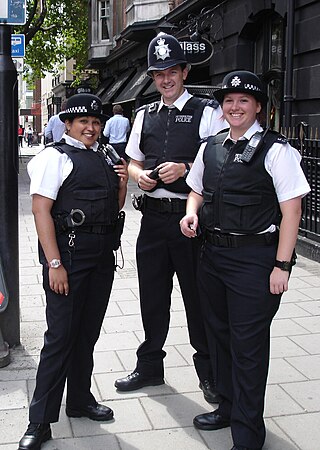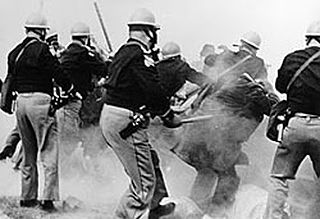
The police are a constituted body of persons empowered by a state, with the aim to enforce the law, protect public order, and the public itself. This commonly includes ensuring the safety, health, and possessions of citizens, and to prevent crime and civil disorder. Their lawful powers encompass arrest and the use of force legitimized by the state via the monopoly on violence. The term is most commonly associated with the police forces of a sovereign state that are authorized to exercise the police power of that state within a defined legal or territorial area of responsibility. Police forces are often defined as being separate from the military and other organizations involved in the defense of the state against foreign aggressors; however, gendarmerie are military units charged with civil policing. Police forces are usually public sector services, funded through taxes.

Police brutality is the excessive and unwarranted use of force by law enforcement against an individual or a group. It is an extreme form of police misconduct and is a civil rights violation. Police brutality includes, but is not limited to, asphyxiation, beatings, shootings, improper takedowns, and unwarranted use of tasers.

The New York City Police Department (NYPD), officially the City of New York Police Department, is the primary law enforcement agency within New York City. Established on May 23, 1845, the NYPD is the largest, and one of the oldest, municipal police departments in the United States.

A police officer is a warranted law employee of a police force. In most countries, "police officer" is a generic term not specifying a particular rank. In some, the use of the rank "officer" is legally reserved for military personnel.

Internal affairs is a division of a law enforcement agency that investigates incidents and possible suspicions of criminal and professional misconduct attributed to members of the parent force. It is thus a mechanism of limited self-governance, "a police force policing itself". The names used by internal affairs divisions vary between agencies and jurisdictions; for example, they may be known as the internal investigations division, professional standards or responsibility, inspector or inspectorate general, internal review board, or similar.

The Indian Police Service is a civil service under the All India Services. It replaced the Indian Imperial Police in 1948, a year after India became independent from the British Empire.

The National Fraternal Order of Police (FOP) is a fraternal organization consisting of sworn law enforcement officers in the United States. It reports a membership of over 355,000 members organized in 2,100 local chapters (lodges), state lodges, and the national Grand Lodge. The organization attempts to improve the working conditions of law enforcement officers and the safety of those they serve through education, legislation, information, community involvement, and employee representation.
The blue wall of silence, also blue code and blue shield, are terms used to denote the informal code of silence among police officers in the United States not to report on a colleague's errors, misconducts, or crimes, especially as related to police brutality in the United States. If questioned about an incident of alleged misconduct involving another officer, while following the code, the officer being questioned would perjure themselves by feigning ignorance of another officer's wrongdoing.

Cops is an American reality legal television documentary programming series that is currently in its 36th season. It is produced by Langley Productions and premiered on the Fox network on March 11, 1989. The series, known for chronicling the lives of law enforcement officials, follows police officers and sheriff's deputies, sometimes backed up by state police or other state agencies, during patrol, calls for service, and other police activities including prostitution and narcotic stings, and occasionally the serving of search/arrest warrants at criminal residences. Some episodes have also featured federal agencies. The show's formula follows the cinéma vérité convention, which does not consist of any narration, scripted dialogue or incidental music/added sound effects, depending entirely on the commentary of the officers and on the actions of the people with whom they come into contact, giving the audience a fly on the wall point of view. Each episode typically consists of three self-contained segments which often end with one or more arrests.
Police misconduct is inappropriate conduct and illegal actions taken by police officers in connection with their official duties. Types of misconduct include among others: sexual offences, coerced false confession, intimidation, false arrest, false imprisonment, falsification of evidence, spoliation of evidence, police perjury, witness tampering, police brutality, police corruption, racial profiling, unwarranted surveillance, unwarranted searches, and unwarranted seizure of property.

As of 2020, more than 800,000 sworn law enforcement officers have been serving in the United States. About 137,000 of those officers work for federal law enforcement agencies.

The Orlando Police Department (OPD) is the municipal law enforcement responsible within the city limits of Orlando, Florida, United States. The OPD employs over 800 sworn officers and over 150 civilian employees serving the citizens of Orlando through crime prevention, criminal investigations, and apprehension, neighbourhood policing, involvement through the schools with young people and overall delivery of police services.
Police accountability involves holding both individual police officers, as well as law enforcement agencies responsible for effectively delivering basic services of crime control and maintaining order, while treating individuals fairly and within the bounds of law. Police are expected to uphold laws, regarding due process, search and seizure, arrests, discrimination, as well as other laws relating to equal employment, sexual harassment, etc. Holding police accountable is important for maintaining the public's "faith in the system". Research has shown that the public prefers independent review of complaints against law enforcement, rather than relying on police departments to conduct internal investigations. There is a suggestion that such oversight would improve the public's view on the way in which police officers are held accountable.

Police brutality is the use of excessive or unnecessary force by personnel affiliated with law enforcement duties when dealing with suspects and civilians.
Civilian oversight, sometimes referred to as civilian review or citizen oversight, is a form of civilian participation in reviewing government activities, most commonly accusations of police misconduct. Members of civilian oversight boards are generally not employed by the government entity which they are reviewing. These groups are tasked with direct involvement in the citizen complaints process and develop solutions to improve government accountability. Responsibilities of civilian oversight groups can vary significantly depending on the jurisdiction and their ability to become influential. Oversight should not simply criticize but should improve government through citizen support for government responsiveness, accountability, transparency, and overall efficiency.
The United States Department of Justice defines school resource officers (SRO) as "sworn law enforcement officers responsible for the safety and crime prevention in schools". They are employed by a local police or sheriff's department and work closely with administrators in an effort to create a safer environment for both students and staff. The powers and responsibilities are similar to those of regular police officers, as they make arrests, respond to calls for service and document incidents.
In the United States, certification and licensure requirements for law enforcement officers vary significantly from state to state. Policing in the United States is highly fragmented, and there are no national minimum standards for licensing police officers in the U.S. Researchers say police are given far more training on use of firearms than on de-escalating provocative situations. On average, US officers spend around 21 weeks training before they are qualified to go on patrol, which is far less than in most other developed countries.

Police reform in the United States is an ongoing political movement that seeks to reform systems of law enforcement throughout the United States. Many goals of the police reform movement center on police accountability. Specific goals may include: lowering the criminal intent standard, limiting or abolishing qualified immunity for law enforcement officers, sensitivity training, conflict prevention and mediation training, updating legal frameworks, and granting administrative subpoena power to the U.S. Department of Justice for "pattern or practice" investigations into police misconduct and police brutality.
In the United States, use of deadly force by police has been a high-profile and contentious issue. In 2022, 1,096 people were killed by police shootings according to The Washington Post, while according to the "Mapping Police Violence" (MPV) project, 1,176 people were killed by police in total. MPV documented 1,213 killings by police for 2023.
The Florida Criminal Justice Standards & Training Commission(CJSTC), established in 1967 under Florida Statutes, Chapter 943, is a Florida state commission. The Commission's mission is "To ensure that all citizens of Florida are served by criminal justice officers who are ethical, qualified, and well-trained." It is part of the Florida Department of Law Enforcement.











